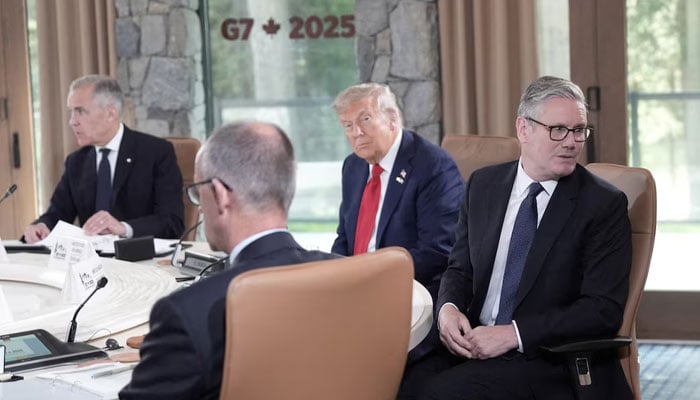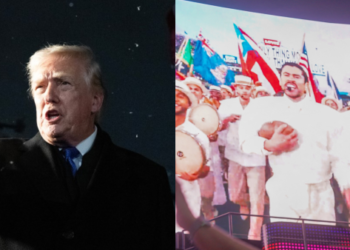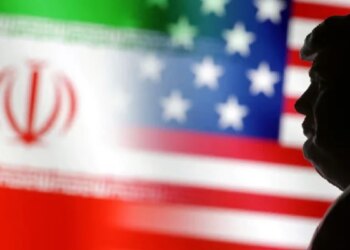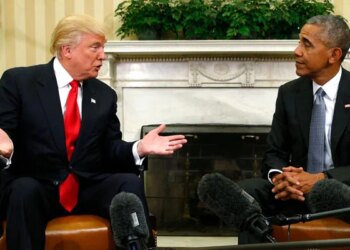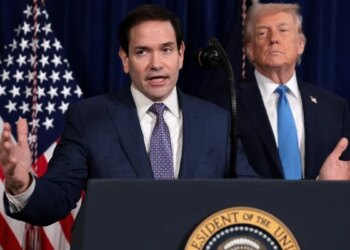Select Language:
- Leaders initiate discussions on global economy and trade disputes.
- Trump will not endorse a joint statement regarding Israel and Iran, says US official.
- Efforts are underway to reintroduce Ukraine on Trump’s agenda.
The G7 leaders gathered on Monday to find a unified stance on the conflicts in Ukraine and the Middle East. Before official proceedings commenced, US President Donald Trump expressed that it was a mistake to exclude Russia from the former Group of Eight over ten years ago.
Trump’s clear support for Russian President Vladimir Putin presented an immediate challenge for the group, which has been struggling to maintain cohesiveness as Washington shifts away from multilateral engagement.
Leaders from Britain, Canada, France, Germany, Italy, Japan, and the US, along with representatives from the European Union, are meeting in the stunning Kananaskis Resort in the Canadian Rockies through Tuesday.
In a discussion with Canadian Prime Minister Mark Carney, Trump remarked that the expulsion of Russia in 2014 following its annexation of Crimea was misguided. “This was a significant error,” he stated, adding that he believes the invasion of Ukraine in 2022 would not have occurred had Putin remained part of the group.
“Putin talks to me. He doesn’t speak to anyone else… he’s not pleased about it. He hardly even engages with those who excluded him, and I agree with him,” Trump said.
These remarks cast doubt on the potential outcomes of Ukrainian President Volodymyr Zelenskiy’s upcoming meeting with the leaders on Tuesday. European nations aim to persuade Trump to endorse stricter sanctions against Russia.
Zelenskiy is expected to address new arms procurement for Ukraine during his discussions with Trump.
Trump had a conversation with Putin on Saturday in which he proposed that the Russian leader might play a mediating role between Israel and Iran. French President Emmanuel Macron dismissed this notion, arguing that Russia could not serve as a negotiator because it initiated an unlawful war against Ukraine.
A European diplomat noted that Trump’s suggestion underscores how prominently Russia remains on US policymakers’ minds.
European officials hope to leverage Tuesday’s meeting with Zelenskiy and NATO Secretary General Mark Rutte, as well as next week’s NATO summit, to convince Trump to adopt a firmer position.
“The G7 should aim for convergence once more, allowing Ukraine to achieve a ceasefire that leads to a strong and lasting peace. In my opinion, it hinges on whether President Trump is ready to propose significantly stricter sanctions against Russia,” Macron commented.
The escalating conflict between Israel and Iran makes this summit in Canada a crucial opportunity to attempt to restore a sense of unity among leading democracies.
In a further indication of potential discord, a US official announced that Trump would not sign off on a draft statement advocating for de-escalation in the Israel-Iran conflict.
However, a Canadian official mentioned that the issue would be raised in bilateral discussions throughout the day and that it’s premature to assume an outcome. A senior European diplomat echoed this sentiment, remarking that Trump has yet to make a decision.
Draft Documents
Canada has decided against pursuing a comprehensive communiqué to avoid a repeat of the 2018 summit in Quebec, where Trump directed the US delegation to retract approval of the final statement after departing.
Leaders prepared multiple draft documents on topics including migration, artificial intelligence, and critical mineral supply chains. However, none has received US approval based on insider accounts.
European representatives largely agree on most issues, according to a diplomat, but the absence of Trump’s concurrence makes the issuance of declarations uncertain.
The initial five months of Trump’s second term have disrupted foreign policy relating to Ukraine, raised concerns about his closer ties with Russia, and resulted in tariffs against US allies.
Discussions on Monday will primarily focus on the economy, advancing trade agreements, and China.
Attempts to agree on lowering the G7 price cap on Russian oil have been complicated by a temporary spike in prices since Israel’s strikes on Iran on June 12, according to two diplomatic sources. Oil prices declined on Monday following reports that Iran was seeking a ceasefire.
The rising tensions between the two regional adversaries are high on the agenda, with diplomatic sources expressing hopes of encouraging restraint and a return to diplomatic avenues, while also pushing Trump to sign a declaration.
“I believe there is a consensus for de-escalation. Our focus today is on bringing together our perspectives and clarifying the means to achieve it,” British Prime Minister Keir Starmer remarked to reporters.

